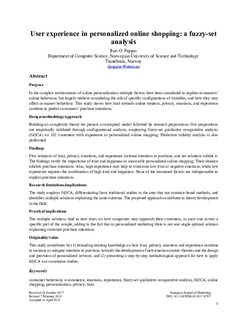| dc.description.abstract | In the complex environments of online personalization, multiple factors have been considered to explain consumers’ online behaviour, but largely without considering the role of specific configurations of variables and how they may affect consumer behaviour. This study aims to show how trust towards online vendors, privacy, emotions and experience combine to predict consumers’ purchase intentions. Building on complexity theory, a conceptual model followed by research propositions is presented. The propositions are empirically validated through configurational analysis, using fuzzy-set qualitative comparative analysis (fsQCA) on 182 customers with experience in personalized online shopping. Predictive validity analysis is also performed. Five solutions of trust, privacy, emotions and experience increase intention to purchase, and six solutions inhibit it. The findings verify the importance of trust and happiness in successful personalized online shopping. Their absence inhibits purchase intentions. Also, high experience may help to overcome low trust or negative emotions, whereas low experience requires the combination of high trust and happiness. None of the examined factors are indispensable to explain purchase intentions. The study uses fsQCA, differentiating from traditional studies in the area that use variance-based methods and identifies multiple solutions explaining the same outcome. The proposed approach contributes to theory development in the field. The multiple solutions lead to new ways on how companies may approach their customers, as each one covers a specific part of the sample, adding to the fact that in personalized marketing there is not one single optimal solution explaining customer purchase intentions. This study contributes by extending existing knowledge on how trust, privacy, emotions and experience combine to increase or mitigate intention to purchase towards the development of new emotion-centric theories and the design and provision of personalized services and presenting a step-by-step methodological approach for how to apply fsQCA in e-commerce studies. | nb_NO |
